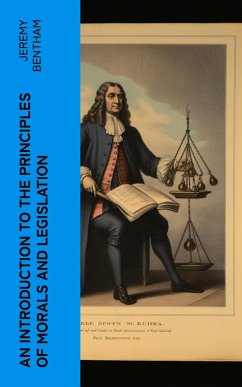'An Introduction to the Principles of Morals and Legislation' is a book by the English philosopher and legal theorist Jeremy Bentham first published in 1789. Labelled as Bentham's "most important theoretical work," it is where Bentham develops his theory of utilitarianism, in respect of ethical theory, and is the first major book on the topic. Bentham seeks to determine what a system of laws would look like if it was constructed on a purely utilitarian basis.
Dieser Download kann aus rechtlichen Gründen nur mit Rechnungsadresse in A, B, BG, CY, CZ, D, DK, EW, E, FIN, F, GR, H, IRL, I, LT, L, LR, M, NL, PL, P, R, S, SLO, SK ausgeliefert werden.









